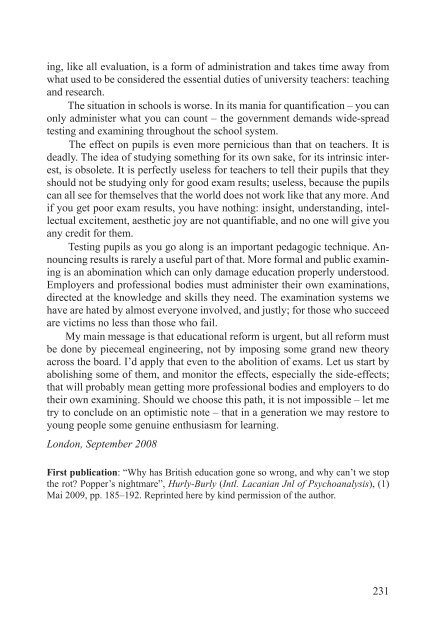Programska knjižica - Hrvatsko filozofsko društvo
Programska knjižica - Hrvatsko filozofsko društvo
Programska knjižica - Hrvatsko filozofsko društvo
Create successful ePaper yourself
Turn your PDF publications into a flip-book with our unique Google optimized e-Paper software.
ing, like all evaluation, is a form of administration and takes time away from<br />
what used to be considered the essential duties of university teachers: teaching<br />
and research.<br />
The situation in schools is worse. In its mania for quantification – you can<br />
only administer what you can count – the government demands wide-spread<br />
testing and examining throughout the school system.<br />
The effect on pupils is even more pernicious than that on teachers. It is<br />
deadly. The idea of studying something for its own sake, for its intrinsic interest,<br />
is obsolete. It is perfectly useless for teachers to tell their pupils that they<br />
should not be studying only for good exam results; useless, because the pupils<br />
can all see for themselves that the world does not work like that any more. And<br />
if you get poor exam results, you have nothing: insight, understanding, intellectual<br />
excitement, aesthetic joy are not quantifiable, and no one will give you<br />
any credit for them.<br />
Testing pupils as you go along is an important pedagogic technique. Announcing<br />
results is rarely a useful part of that. More formal and public examining<br />
is an abomination which can only damage education properly understood.<br />
Employers and professional bodies must administer their own examinations,<br />
directed at the knowledge and skills they need. The examination systems we<br />
have are hated by almost everyone involved, and justly; for those who succeed<br />
are victims no less than those who fail.<br />
My main message is that educational reform is urgent, but all reform must<br />
be done by piecemeal engineering, not by imposing some grand new theory<br />
across the board. I’d apply that even to the abolition of exams. Let us start by<br />
abolishing some of them, and monitor the effects, especially the side-effects;<br />
that will probably mean getting more professional bodies and employers to do<br />
their own examining. Should we choose this path, it is not impossible – let me<br />
try to conclude on an optimistic note – that in a generation we may restore to<br />
young people some genuine enthusiasm for learning.<br />
London, September 2008<br />
First publication: “Why has British education gone so wrong, and why can’t we stop<br />
the rot? Popper’s nightmare”, Hurly-Burly (Intl. Lacanian Jnl of Psychoanalysis), (1)<br />
Mai 2009, pp. 185–192. Reprinted here by kind permission of the author.<br />
231

















